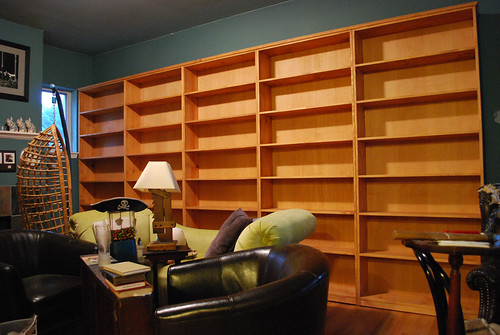
{Photo by rocketlass.}
Having given up, for now, our plans to sell our condo and move to a house possessed of a garden, we spent last Friday night unpacking and reshelving our eighty-plus boxes of books. Friends helped--we owe @santheo and @joegermuska drink after drink after drink--and the work went well, a gradual unearthing of old familiars. For a year, we’d been reduced to one bookcase, a carefully selected group of the unread and the perennial, and I think we did reasonably well in our choices. In his strange and charming Anatomy of Bibliomania, Holbrook Jackson wrote of the sort of enforced paring we’d endured:
Many have speculated upon which are the best books, and it is no easy matter to come to a conclusion where there are so many claimants; especially it is difficult to decide upon what books, or book, were we confined to one, we would choose for an imprisonment, or if marooned on a desert island.Andre Gide, he reveals, “as a youth made out such a list every quarter”--and never included a single novel.
But as book after book emerged, I realized that, while they’d not been forgotten, they had been relegated to a strange spot in the memory, a sort of vault of denial--remembered, yet locked away, inaccessible. So in the past week I’ve enjoyed diving back into old favorites. Tonight, it’s Charles M. Doughty’s Travels in Arabia Deserta (1888). The two-volume Dover edition I have, which, sadly, is out of print, features an introduction by T. E. Lawrence, in which, while praising Doughty, he classifies the adventuring sort of Englishman:
We export two chief kinds of Englishman, who in foreign parts divide themselves into two opposed classes. Some feel deeply the influence of the native people, and try to adjust themselves to its atmosphere and spirit. To fit themselves modestly into the picture they suppress all in them that would be discordant with local habits and colours. They imitate the native as far as possible, and so avoid friction in their daily life. However, they cannot avoid the consequences of imitation, a hollow, worthless thing. They are like the people but not of the people, and their half-perceptible differences give them a sham influence often greater than their merit. They urge the people among whom they live into strange, unnatural courses by imitating them so well that they are imitated back again. The other class of Englishman is the larger class. In the same circumstance of exile they reinforce their character by memories of the life they have left. In reaction against their foreign surroundings they take refuge in the England that was theirs. They assert their aloofness, their immunity, the more vividly for their loneliness and weakness. They impress the peoples among whom they live by reaction, by giving them an ensample of the complete Englishman, the foreigner intact.Doughty, explains Lawrence, was a member of the second group:
His seeing is altogether English, yet at the same time his externals, his manners, his dress, and his speech were Arabic, and nomad Arab, of the desert. . . . His record ebbs and flows with his experience, and by reading not a part of the book but all of it you obtain a many-sided sympathetic vision, in the round, of his companions of these stormy and eventful years.And on this quiet, cool, autumnal Friday night, it seems right to bid the summer adieu with a passage from Doughty:
The lingering day draws down to the sun-setting; the herdsman, weary of the sun, come again with the cattle, to taste in their menzils the first sweetness of mirth and repose.--The day is done, and there rises the nightly freshness of this purest mountain air: and there to the cheerful cup and the song at the common fire. The moon rises ruddy from that solemn obscurity of jebel like a mighty beacon:--and the morrow will be as this day, days deadly drowned in the sun of the summer wilderness.I think it would be impossible for me to grow to love the desert; the upper Midwest is too deep in my bones. But if anyone could set that hook, it would be Doughty.
Oh, it's good to have these books back at hand.
I've coveted your bookcases ever since I saw them for the first time on your blog a few months ago. Can you say where you got them?
ReplyDeleteSure: we get our bookcases at 57th Street Bookcase and Cabinet (which is, oddly, not on or near any 57th Street these days). The ones we've got are the standard seven-shelf ones, which their installers can set up with a top to make them look like they're all one piece, almost like built-ins. They're not cheap, but they're extremely well made and will last more or less forever.
ReplyDeleteDid T.E. say what sort of Englishman he was?
ReplyDeleteHe doesn't, but he does say that the latter sort--the one Doughty is--is the better sort, which makes me think surely he thought of himself as of that class, right?
ReplyDeleteIt has been a long time since I've read Seven Pillars of Wisdom, so I get it conflated with the movie, but it seems like Lawrence sure liked his robes.
ReplyDeleteThat book was also where I learned that coffee could not possibly really be dehydrating, as the nomads were drinking it all the time.